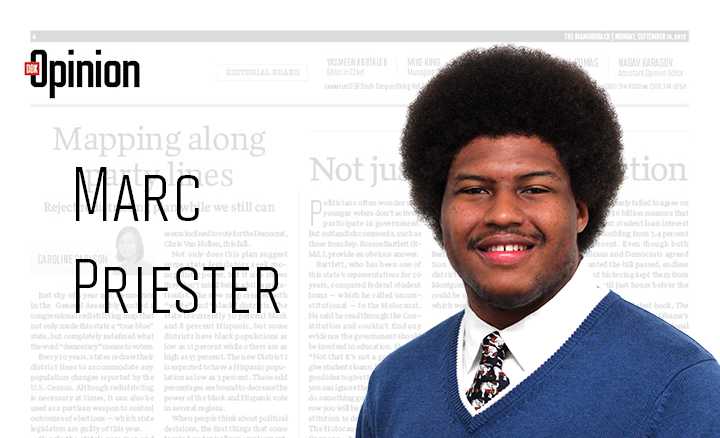
Junior economics and government and politics major
Before one disregards the Inclusive Language Campaign posters as little more than an irritation and an eyesore, it is imperative to understand what exactly we are combating and why it is the university’s obligation to pursue this path.
It almost seems intuitive — using offensive phrases is bad; therefore, don’t use offensive phrases. Obviously, this is a very noncontroversial assessment, yet if we all reevaluate our lives, it isn’t so cut and dry. You see, individuals probably say several phrases and words every day that insult people in some way. We may not explicitly hear it from the offended person’s mouth because there are clear incentives to be silent — for example, avoiding an awkward situation, embarrassment or even loss of a friend.
These posters are actually mechanisms that speak for the speechless. Many of these posters include everyday speech that is, unfortunately, seen as acceptable vernacular. When people say, “I raped that test,” they may not actually understand the impact their words have on the people around them.
By acting as a proxy rebuttal toward people using offensive language, the posters expose unintentional offenders to some examples of how one may be taken aback by what they say.
Moreover, the posters seem to include a diverse methodology for individuals to combat crass language. Though some of the Inclusive Language posters are simple text bubbles with offensive phrases and responses, others actually include descriptive paragraphs that address both the origin of offensive language in everyday conversation and various ways to contest their merits.
For example, the poster occupying the wall just outside my apartment door (what a friendly reminder!) outlines how most individuals who use offensive language are not often bigots but simply misguided insofar as they do not realize that their words do offend. This is an important distinction to substantiate — the form of insensitivity we encounter on college campuses is not necessarily hatred, just ignorance.
The poster then acts as a cohesive and reasonable guide on how one may properly identify troublesome rhetoric and assist the user of the offensive phrases in becoming knowledgeable about how his or her word choice was disturbing. Clearly, the intended outcome will result in a peaceful resolution in which the offenders will internalize their folly and preclude themselves from using such language.
I do recognize one extremely challenging element that seems inherent in displaying posters with offensive language. Going back to the example earlier, one of the posters says, “I raped that test,” and the response: “Would you say that if you knew I am a sexual assault survivor?” This may disturb those with an intimate familiarity of such traumatizing experiences. Especially for students who may not yet have come to terms with this trauma, seeing these posters may trigger distressful memories.
However, we must remember that hearing people casually throw around words such as “rape” in a manner that marginalizes the act will be more damaging. If survivors continually hear acquaintances and friends say these disconcerting words, this will not only agonize them by proliferating memories, but because of irreverent usage, one will further feel alienated by the fact that his or her experience is treated as nothing more than the punch line of a joke. Therefore, the net utility of avoiding this travesty through education outweighs the comparatively smaller (but still important) discomfort of the posters.
At the end of the day, students have an obligation to attempt to minimize their offense for the benefit of all. I’m proud to attend a university that believes in that same goal.
Marc Priester is a junior economics and government and politics major. He can be reached at mpriesterdbk@gmail.com.



